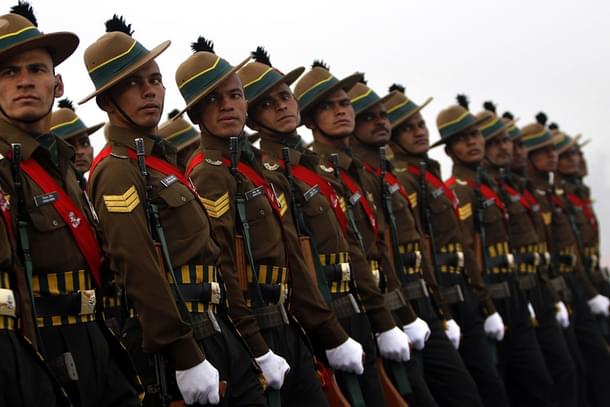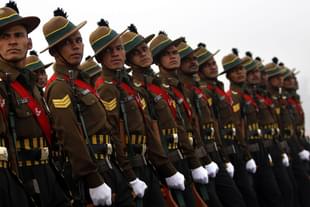Defence
Explained: What Notification Of Tri-Services Disciplinary Act Means For Integration Of The Three Armed Forces
Ujjwal Shrotryia
May 13, 2024, 05:31 PM | Updated 05:31 PM IST
Save & read from anywhere!
Bookmark stories for easy access on any device or the Swarajya app.


The Government of India (GoI) has notified the Inter-Services Organisation (Command, Control, and Discipline) Act, marking another step on the long road to the creation of Integrated Theatre Commands (ITCs).
The bill was signed by the President on 15 August last year.
This act will go a long way in integration of the tri-services and is one of many steps leading to the ITCs.
It will allow the commanders of tri-services organisations like the Andaman and Nicobar Command (ANC) or the Strategic Forces Command to exercise disciplinary powers over all personnel.
As of now, the Commander-in-Chief of the tri-services command has disciplinary powers only over personnel of his own service. He cannot exercise administrative powers over personnel from other services.
For example, an Indian Army General serving as the head of the ANC does not possess administrative authority over Indian Navy and Indian Air Force officers under his command.
However, the general does wield administrative powers over army officers within the ANC. Any administrative action can only be taken by their respective parent services under their respective service acts only.
The notification comes at a time when the Indian armed forces has begun to cross-post officers into other services. For example, an officer of the army can be posted to the air force, or the navy, and vice versa.
Until now, only a small number of officers has taken such cross-services posting.
Officers will be moved to missile units where they will handle UAVs, logistics, repair and recovery, as well as manage materials and supplies. Shared equipment, weapon systems, and platforms between services will allow officers to gain a better understanding of the service they are currently serving in and ultimately lead to increased synergy and integration.
Creating cross-functional teams is crucial for achieving theaterisation.
By learning the ethos and nuances of all services early in their careers, officers will be better equipped to function effectively within this structure.
According to reports, the GoI is considering creating two adversary-specific theatre commands, as opposed to the earlier proposed four geographically based theatre commands.
A Lucknow-based theatre command will cater to China, while a Jaipur-based theatre command will look after Pakistan. Both of these commands will be commanded by air force and army officers on a rotational basis, while a third maritime-specific command will be commanded by a navy officer.
This act will empower the theatre commander to have disciplinary powers over all soldiers (whether of the army, navy, or the air force) under his command.
Although this is just one in a series of steps to bring theatre commands to reality, however, how long it will actually take cannot be said with certainty.
Staff Writer at Swarajya. Writes on Indian Military and Defence.





